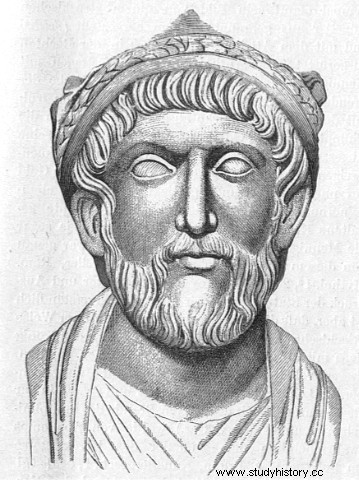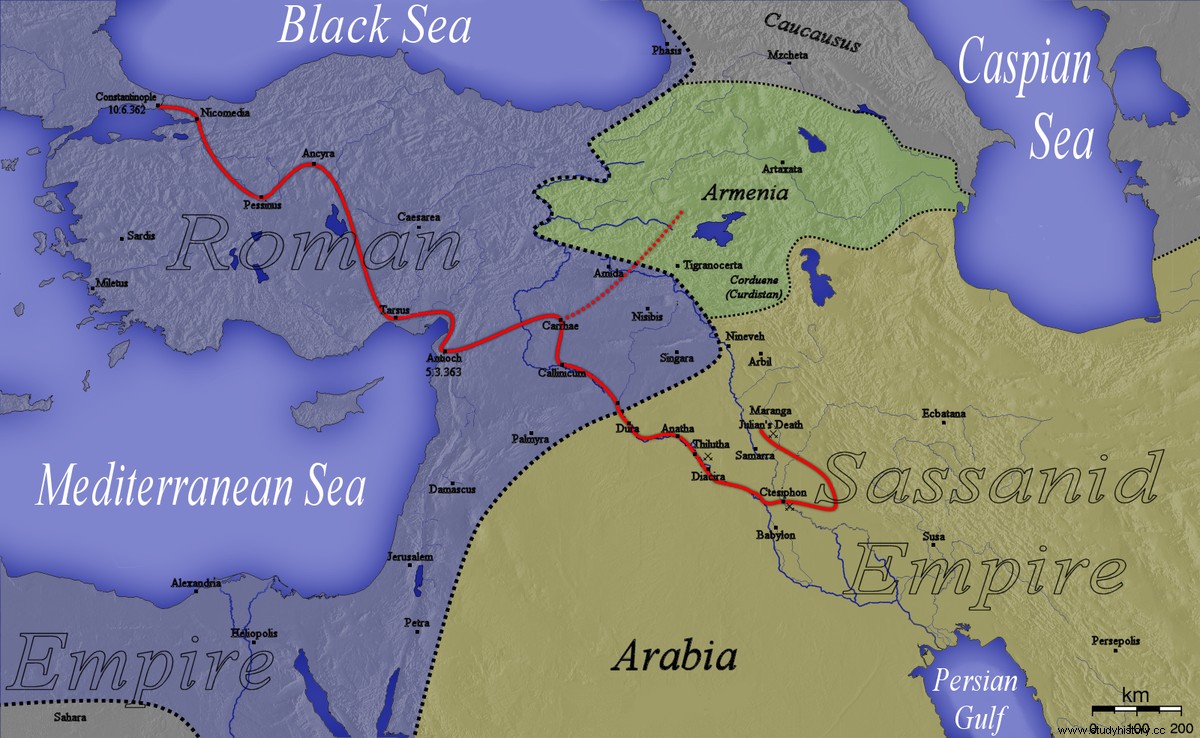
Tetrarchy, which was started by Emperor Diocletian, returned to one-man rule by Emperor Constantine, but his successors began a divide-and-conquer rule and began a bloody battle.
It was Emperor Julian who survived rather than controlled such a situation.
Captive childhood
Julian's father was Julian Constantius, the son of the first Constantius and the half-brother of Constantine.
Emperor Constantius separated from Helena, who was originally married, and married Theodora, the daughter of Emperor Maximian.
Constantine was the child born to Helena, and Julian's father was born to Theodora.
When Emperor Constantine died, his successors were narrowed down to eight.
Two of them, Julian's father and his younger brother Hannibalianus, were murdered. The bad guys are unknown, but there is no doubt that it is a force centered on the three sons of Emperor Constantine or the eunuch official behind them.
The surviving sons of Hannibalianus, Gallus and Julianus, were forced to live in de facto imprisonment by being forced to move around in the capitals of Constantiple, Nicomedia, Butinia, and Macellus.
It seems that young Julian learned Greek philosophy during that period. The military had nothing to do with politics, but as Constantine's children died, and with one, Constantine, who survived, appoints Gallus, who had been imprisoned, as his deputy emperor.
The harsh imprisonment is said to have destroyed the spirit of Gallus, who has become a tyrant, including a slaughter, and was executed by Emperor Constantius.
Instead, it was Julian that the arrow of white feathers stood.
Vice Emperor Julian
In 355 AD, Julian became a deputy emperor at the age of 24.
Julian is in charge of the western part of the empire, mainly dealing with the Germanic people.
It is only a foolish idea to instruct Julian, who has no military experience, to take measures against the Germanic people, who are the greatest enemy of Rome, but Constantius, who is the emperor in the first place, has become an emperor without military experience, and the feeling around here is cultivated. It seems there wasn't.
However, the only remaining imperial family at that time was Julian, and I think there was no choice.
Julian, who crossed the winter Alps with a few escorts, arrived in Gaul. The Gaul region, which was Romanized by Julius Caesar, was said to be a sample of Romanization, and Julian's rule of Gaul was very successful. Its reputation is as good as it is in the present French Republic, but at that time the region was devastated by the rebellion of the bandit general Magnentis, and it was not easy to recover due to the repeated invasion of the Germanic people.
Julian soon began fighting the Germanic people. He wins the battle against the Alemanni, a leading Germanic tribe, and the Franks who occupied Cologne.
Victory in the Battle of Strasbourg (Battle of Argentoratum) and inauguration of the Emperor
Strasbourg, also known as the crossroads of Europe, has historically been a land where France and Germany compete for each other, but it was in 357 AD that the battle between the Roman Empire and the Germanic sex was fought in this land.
The Alemanni, one of the leading Germanic tribes, invaded the Roman Empire of Gaul with a force of 35,000. On the other hand, Julian's troops are 13000.
Julian won this battle, which was originally a battle that could not be won.
Julian is said to have spearheaded himself in the battle during this battle, which greatly increased the command of his generals and, after his victory, made his fame spread throughout Rome. Become.
People living in the Roman Empire gradually want to become Julian's emperor.
In such a situation, Emperor Constantis sought reinforcements for Julian, but the Galians who did not want to leave the land of Gaul supported Julian as an emperor, and reinforcements were not dispatched.
Julian decides to fight Constantius and heads east. Constantius, on the other hand, headed west, but died of illness on the way and appointed Julian as his successor.
Julian entered the capital, Constantinople, and held the funeral of Emperor Constantius.
The birth of Emperor Julian.
Apostate Julian
Julian was such an excellent emperor, but history calls him this way.
Apostata Julian
The reason is that Julian did not give preferential treatment to Christianity.
In reality, he only acknowledged his religious freedom and quit his Christian favor in accordance with the Edict of Milan.
In theory, it can be said that Emperor Constantine was the one who violated the law without observing the Edict of Milan issued by himself.
Just because it's extrajudicial, no one could impeach it.
Religion sometimes goes beyond law and theory.
It is the apostate who does not give preferential treatment to Christianity.
Julian has never been a Christian enough, but in a distorted view of Christian history he was only an apostate.
However, in Julian, it is a mere fact that he is not a Christian.
Both Emperor Constantine and Emperor Constantius gave special preferential treatment to Christians, and the proportion of high-ranking bureaucrats in the empire was already high.
This is also the case at the commander level of the army, which will bring tragedy later.
He was trying to return Rome to its original Senate-focused regime, which was eventually hampered by Christian bureaucrats.
The downside of the bureaucratic system is that it becomes bloated, as it does in modern Japan. At that time, Rome's national finances were tight due to the bureaucracy, and it was in a state of being uncertain. This is also common with modern Japan.
The bureaucracy creates jobs for work and increases spending infinitely. Eventually, no one can stop the runaway of overgrown bureaucrats, forcing the nation to decline. Even if you notice it, no one can resist it.
Persian expedition and death

Julian's attempted reforms were crushed by angry Christian bureaucrats.
Those with vested interests will try their best to protect it.
In such a situation, Julian had to go east.
This is because the Sasanian Persia did not break its tough stance.
Even with the Germanic invasion, Rome's first hypothesis remained Persian from the time of Augustus.
At that time, Persia was Shapur II, who is famous as Ei-kun.
Julian was on the offensive with 80,000 troops.
The battle was in favor of Julian from beginning to end, and finally came close to Ctesiphon, but in the end he could not attack and decided to withdraw, which was the aim of the Sasanian Empire and was pursued there.
The Roman side was still strong in the big battle, but the Sassanid side developed a guerrilla battle with a small number of soldiers and hunted down a little more.
And Julian died.
There is a strong theory that Julian died after being stabbed by a spear on his side.
It is said that the last word, "Galarians, thou shalt win," means that it was killed by Christians.
In fact, no Roman emperor since then was non-Christian.
300 years after Christ died, he finally won!
After Julian's death
Julian died, and a man named Jovianus succeeded him. This person died on his way back to Constantinople. He is probably an assassination. It is not even speculated who killed it.
Valentinianus was appointed as the next emperor.
The first Germanic emperor of the Roman Empire.
The only thing to add about him is the first Germanic Christian emperor.
Personal evaluation of Julian
Julian would be one of the Roman emperors who had long been unfairly evaluated.
According to the view of Christian history, he was just an apostate because he tried to restore Roman politics, which was leaning toward Christianity.
Julian's policies are all unsuccessful in terms of results. In the end, it was crushed by the Christian forces that Constantine laid the foundation for.
He won the fight against the Germanic people militarily, but lost the fight against Persia.
There are various causes of defeat. He split his unit into two, but the other did not come as planned. Julian was often harassed, and even when he was fighting the Germanic, his commander did not come.
It can be said that the Roman emperor had no choice but to become a Christian.
Among them, Julian could certainly say that the times could not be read. He or he may have had a backlash against the sons of Constantine, who detained him and killed his father.
If Julian was born in the Roman Republic, he would have become a well-known commander.
The Roman Empire was virtually over in the days of Constantine.
